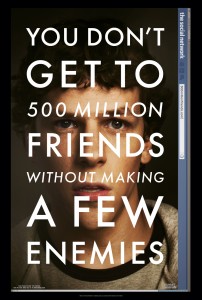Do you have 500 million friends?
 This weekend marked the release of The Social Network, the film about the creation of Facebook, the website with 500 million members worldwide. I’ll admit that when social networks starting gaining steam, I quickly dismissed them as forums for narcissistic teens and internet stalkers. But when my son reached the age of but-all-my-friends-have-a-Facebook-account, I acquiesced under the condition that I could log into his account at will to monitor his activity. We reached an accord.
This weekend marked the release of The Social Network, the film about the creation of Facebook, the website with 500 million members worldwide. I’ll admit that when social networks starting gaining steam, I quickly dismissed them as forums for narcissistic teens and internet stalkers. But when my son reached the age of but-all-my-friends-have-a-Facebook-account, I acquiesced under the condition that I could log into his account at will to monitor his activity. We reached an accord.
The first time I logged on, I couldn’t figure out what I was looking at. What’s a Wall? What is Flair? What is poking? (It didn’t sound like something I wanted my teenaged boy to be doing.) I wanted to explore this strange new world but didn’t want to do anything to possibly disrupt his page…or heaven forbid, embarrass him. So I established my own Facebook account.
Within a day or two, I had been found by some other parents in our neighborhood, who sent me Friend Requests. I accepted, and before long, I had a handful of local Facebook friends. Then I got a friend request from a high school friend with whom I had lost touch for decades. This was kind of fun. My son even “friended” me. Who knew the word friend had become a verb?
Friending someone on Facebook means different things depending on one’s age group. For the younger set, it’s more about collecting friends than really connecting with friends. One of my teenaged relatives has 1,579 friends. I don’t even know that many people, much less want to befriend them online.
As my group of online friends and family topped the 100 mark, I started to realize that I couldn’t keep up with all the posts. I would just have to miss some of the latest goings on in my friends’ lives. And, like the TV series Lost, where people initially pull together in a shared experience, the group eventually began to splinter. Politics reared its ugly head, and many friends began to show their true colors…namely red and blue. I watched as people who had been pals for years suddenly unfriended each other over disagreements about health insurance, tax cuts and government spending. Talk about taking the fun out of reconnecting with friends. Maybe this is why many of us lost touch to begin with.
But there is an upside. Social networks can serve as great information resources and helpful support groups. I was born with a very rare condition called pseudoarthrosis resulting in a leg that easily fractured, never to heal. As a child, I knew of no one else with this condition, and my parents were in the dark. I recently found a Facebook support group for children with pseudoarthrosis and their parents. At this point in my life, it is I who is giving the support to others. But wouldn’t it have been wonderful to have Facebook decades ago when my family and I had no one to turn to?
So now, a few years into my Facebookness, I find the environment closely resembles life. We naturally resonate with some people more so than others. Some friends are like the seasons, falling away or going dormant, then suddenly reappearing like spring blossoms. And when times are tough, we see who our true friends really are, whether online or in the flesh.
What do you think about social networks? “Like” or “Unlike?”
As you say, much like life – you get out of it what you put into it, I think. I do not discuss politics with many friends and in general avoid it on Facebook unless it is a specific issue about which I feel strongly. I have some friends there who are just acquaintances or friends of friends 🙂 – but that’s fine. I generally “like” the experience of being able to share there and sometimes the community feedback is informative and touching – but I really do not share anything terribly personal. Too old for that 🙂